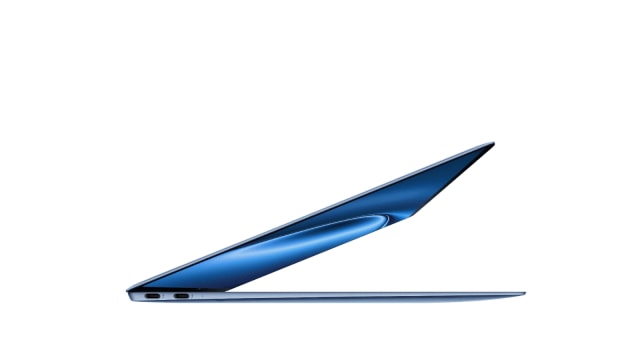 |
| The MateBook Pro model, which uses a conventional laptop keyboard, is priced from 7,999 yuan. (Image Source: Huawei) |
The Transition from Windows to HarmonyOS
Huawei's decision to develop HarmonyOS for PCs stems from the expiration of its Microsoft Windows license in March 2025. This development compelled the tech giant to accelerate its efforts in creating an independent operating system, aiming to provide a seamless experience across its range of devices, including smartphones, tablets, and now, laptops.
Introducing the MateBook Fold: A Revolutionary Design
The MateBook Fold stands out with its innovative design, featuring an 18-inch OLED display that folds to create a 13-inch screen with a digital keyboard. When unfolded, the device measures just 7.3mm thick, making it one of the thinnest laptops available. Weighing approximately 1.16kg, it offers portability without compromising on performance. The high-resolution 3.3K display boasts up to 1600 nits of brightness, ensuring vivid visuals for users.
MateBook Pro: Traditional Design Meets Modern Performance
For users preferring a conventional laptop design, the MateBook Pro offers a familiar form factor equipped with HarmonyOS 5. Priced from 7,999 yuan, it caters to professionals seeking reliability and efficiency. While specific hardware details remain undisclosed, Huawei emphasizes that the higher pricing reflects the investment in new manufacturing technologies and the integration of advanced features.
HarmonyOS 5: Features and Ecosystem
HarmonyOS 5 is designed to provide a cohesive and secure user experience. Key features include:
Enhanced Security: Incorporates chip-level full-disk encryption and a super privacy mode that disables the camera, microphone, and location access system-wide.
AI Integration: Features Huawei's AI assistant, Celia, capable of tasks like creating slides, summarizing meetings, and retrieving information from documents.South China Morning Post+1Wikipedia+1
Cross-Device Collaboration: Enables seamless interaction across Huawei devices, allowing users to control and move between screens of phones, tablets, and computers with a keyboard and mouse.Uni India
App Ecosystem: Supports over 150 applications, including WPS Office and Meitu Xiu Xiu, with plans to expand to over 2,000 apps by the end of the year.
Strategic Implications for Huawei and the Tech Industry
Huawei's launch of HarmonyOS-powered laptops signifies a broader trend of tech companies seeking greater control over their software and hardware ecosystems. By developing its own operating system, Huawei aims to mitigate the impact of international trade restrictions and establish a self-reliant technology infrastructure. This move could influence other manufacturers to explore similar strategies, potentially reshaping the global tech landscape.
Conclusion
The introduction of the MateBook Fold and MateBook Pro marks a pivotal moment for Huawei, showcasing its commitment to innovation and independence in the face of external challenges. As HarmonyOS continues to evolve, it will be interesting to observe how it competes with established operating systems like Windows and macOS, and how it influences the future of personal computing.





0 Comments